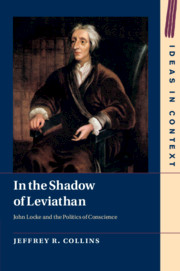Book contents
- In the Shadow of Leviathan
- Ideas in Context
- In the Shadow of Leviathan
- Copyright page
- Dedication
- Contents
- Acknowledgements
- Note on the Text
- Abbreviations
- Introduction
- Chapter 1 John Locke and Interregnum Hobbism
- Chapter 2 The Restoration Projects of Thomas Hobbes
- Chapter 3 Locke and the Restoration Politique
- Chapter 4 Non-domination Liberty in Spiritual Context
- Chapter 5 Locke, Conscience, and the Libertas Ecclesiae
- Chapter 6 Locke and Catholicism
- Chapter 7 Locke and a ‘More Liberal’ Hobbism
- Conclusion
- Bibliography
- Index
- Ideas In Context
Chapter 4 - Non-domination Liberty in Spiritual Context
Published online by Cambridge University Press: 07 February 2020
- In the Shadow of Leviathan
- Ideas in Context
- In the Shadow of Leviathan
- Copyright page
- Dedication
- Contents
- Acknowledgements
- Note on the Text
- Abbreviations
- Introduction
- Chapter 1 John Locke and Interregnum Hobbism
- Chapter 2 The Restoration Projects of Thomas Hobbes
- Chapter 3 Locke and the Restoration Politique
- Chapter 4 Non-domination Liberty in Spiritual Context
- Chapter 5 Locke, Conscience, and the Libertas Ecclesiae
- Chapter 6 Locke and Catholicism
- Chapter 7 Locke and a ‘More Liberal’ Hobbism
- Conclusion
- Bibliography
- Index
- Ideas In Context
Summary
Chapter 4 offers a synthetic interpretation of the Indulgence policies pursued by Charles II and James II across more than two decades of rule. Three major attempts at Indulgence in England, and more in Scotland and Ireland, produced political controversies and bitter polemics. This chapter interprets these battles over Indulgence within as skirmishes in the larger war between the politique court culture of the Stuart dynasty and the sometimes beleaguered interests of the established church. Hobbism, in this reading, appealed to politiques and their allies among tolerationist nonconformists. The church’s opposition to Indulgence as Hobbesian statecraft, however, pressured the position of nonconformity and forced dissenters to devise firmer foundations for the freedom of conscience. Locke’s own tolerationism would mature against these broader developments. In interpreting this history, the chapter makes use of the concept of ‘non-domination liberty’ devised by neo-Republican theorists such as Philip Pettit and Quentin Skinner
- Type
- Chapter
- Information
- In the Shadow of LeviathanJohn Locke and the Politics of Conscience, pp. 172 - 211Publisher: Cambridge University PressPrint publication year: 2020

